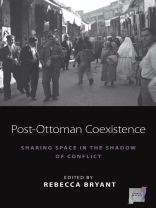In Southeast Europe, the Balkans, and Middle East, scholars often refer to the “peaceful coexistence” of various religious and ethnic groups under the Ottoman Empire before ethnonationalist conflicts dissolved that shared space and created legacies of division. Post-Ottoman Coexistence interrogates ways of living together and asks what practices enabled centuries of cooperation and sharing, as well as how and when such sharing was disrupted. Contributors discuss both historical and contemporary practices of coexistence within the context of ethno-national conflict and its aftermath.
Зміст
List of illustrations
Acknowledgments
Introduction: Everyday Coexistence in the Post-Ottoman Space
Rebecca Bryant
PART I: LANDSCAPES OF COEXISTENCE AND CONFLICT
Chapter 1. Sharing Traditions of Land Use and Ownership: Considering the “Ground” for Coexistence and Conflict in Pre-Modern Cyprus
Irene Dietzel
Chapter 2. Intersecting Religioscapes in Post-Ottoman Spaces: Trajectories Of Change, Competition And Sharing Of Religious Spaces
Robert M. Hayden
Chapter 3. Cosmopolitanism or Constitutive Violence? The Creation of “Turkish” Iraklio
Aris Anagnostopoulos
Chapter 4. Trade and Exchange in Nicosia’s Shared Realm: Ermou Street in the 1940s and 1950s
Anita Bakshi
PART II: PERFORMING COEXISTENCE AND DIFFERENCE
Chapter 5. In Bed Together: Coexistence in Togo Mizrahi’s Alexandria Films
Deborah A. Starr
Chapter 6. Memory, Conviviality and Coexistence: Negotiating Class Differences in Burgazadası, Istanbul
Deniz Neriman Duru
Chapter 7. “If you write this tačno, it will be točno!”: Performing Linguistic Difference in Postwar Bosnia and Herzegovina
Azra Hromadzic
*This chapter is not available in the open access edition due to rights restrictions. It is accessible in the print edition, spanning pages 180-206.
PART III: NEGOTIATING EVERYDAY COEXISTENCE IN THE SHADOW OF CONFLICT
Chapter 8. The Istanbul Armenians: Negotiating Coexistence
Sossie Kasbarian
Chapter 9. A Conflict of Spaces or of Recognition? Co-Presence in Divided Jerusalem
Sylvaine Bulle
Chapter 10. Grounds for Sharing, Occasions for Conflict: An Inquiry into the Social Foundations of Cohabitation and Antagonism
Glenn Bowman
Index
Про автора
Rebecca Bryant is Professor of Cultural Anthropology at Utrecht University and Visiting Professor in the European Institute of the London School of Economics and Political Science. She is the author of numerous works examining the ongoing division in Cyprus, including The Past in Pieces: Belonging in the New Cyprus (University of Pennsylvania Press, 2010) and Sovereignty Suspended: Building the So-Called State (University of Pennsylvania Press, 2020).












